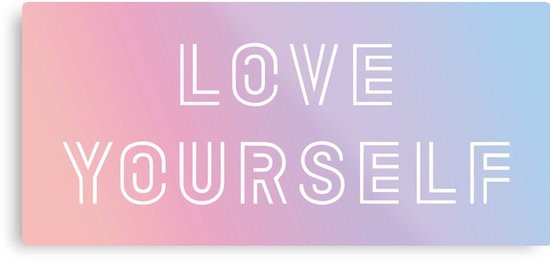Goals
I have struggled with self confidence for as long as I can remember, and so I took this project as an opportunity to work on building it. I’ve been working on this with my therapist for two years already, so this project wont be a quick fix, but I’m hoping it will be another small step in my journey towards the denouncement of self hatred and the acquisition of self love.

**insert image 2**
Book *
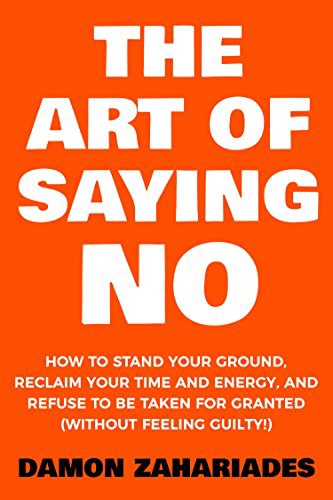
The book I chose is called The Art of Saying No, by Damon Zacchariades. The book basically provides a personal perspective and advice on how to stop being a people pleaser. It talks a lot about self confidence, how when a person doesn’t value themselves they tend to put the needs of other in front of their own, which leads to difficulty advocating for themselves. The book provides lots of techniques to assist in saying no to people, and a lot of these techniques involve recognizing your own value, and accepting that you cannot control the reactions of others. I found the book very helpful, because it talked about a lot of things that I could directly relate to myself and to my life. For example:
- “Burdened with a low self-image, we mistakenly believe our time is worth less than others’ time” (41)
- “We perceive our value to the world as somehow less than the value offered by those around us”(42)
- “The gratitude we receive [from completing a request] allows us to forget about the traits we dislike about ourselves”(40).
To apply this to my own life, I created a template to record the instances in which I either say no, or voice an opinion on what I want to do. For each instance, I record what I said/said no to, why I did it, and how I felt afterwards. The book emphasizes how saying no becomes easier with practice, and so this method also incorporates practice to become better at saying no.
Helpful Book
The book provided lots of useful tips for saying no. In fact, there was a whole section called “10 Strategies for Saying No (Without Feeling Like a Jerk)”. My favorites, and the ones I feel are most helpful in building self esteem are
- Use phrasing that expresses your will, not “I can’t” statements, because “I can’t” leads us to believe that “external factors undermine our authority, and that our personal decisions aren’t truly ours to make”(78). Instead, use “I don’t want to,” because expressing your personal will lead to more confidence in “turning down requests that conflict with your needs and convictions”(79).
- Realize you’re not responsible for others’ reactions, and realize they may have unrealistic expectations for you. “As long as you turn down a request with France and respect, you shouldn’t feel accountable if the requester reacts poorly”(108)
- “It’s critical that you recognize your own value”(109). “Recognizing your own value forces you to acknowledge that your time, interests, opinions and goals are worth just as much as other people’s.”(110). A strong sense of self worth can give you the “courage to stand your ground when you face emotional manipulation or intimidation”.
- “Self care isn’t selfish. It’s necessary”(37). This one is very important. Take note everyone!!
Strategies
When I signed up for this class I expected a mildly interesting, one dimensional course, but when I saw that Chapter 1 focused on self confidence I was surprised to realize that I could actually apply the material from this course to my personal life. My therapist and I have explored my struggles of self esteem in gory detail, but the information from the book helped to highlight how these struggles impact my academics.
Chapter 1: Motivation and Self Efficacy
*insert image 4*

In chapter 1, I learned about self efficacy, which is your belief in your ability to succeed. Self confident people think positively about their ability to succeed, therefore higher self confidence leads to higher self efficacy, which leads to higher motivation, which leads to a higher chance of success. This transitive correlation between self confidence and success further confirmed my certainty that the quality of my life would be so much better if I had self confidence. Furthermore, the chapter details the cognitive behavioral model and the self fulfilling prophecy, which state that in a cyclical way the way you think about yourself impacts your behavior, and your behavior impacts the way you think about yourself. I have been tossed around by this vicious cycle quite a few times; by committing self destructive behavior because I think it will help my self esteem, only to realize it actually kicks down my self esteem and puts me back in the same position of desperation to feel good about myself.
The book claims cognitive distortions as a prominent barrier to self esteem. Common distortions include thinking in absolutes with a fixed mindset, and catastrophizing. My personal barriers have a lot to do with how I see myself, and the fact that I do not like what I see. This personal hatred was once so severe it lead me to struggle with an eating disorder. With lots of help from my family and my therapist and nutritionist, I was able to pull myself out of that hole, and since then I have been working on accepting myself and eventually even loving myself.
The solution provided by the book is to counter these distortions with realistic, positive self talk, which is already something I have been working on with my therapist. My entire family is involved in raising my self esteem at this point, and my mom created a metaphor that my self esteem is a little baby, and that I should not be leaving it in the hot car. So whenever I make a self deprecating remark my family is quick to say “take the baby out of the hot car!”
Besides this awkwardly personal chapter, there were also other parts of the book that related to the completion of my project, specifically chapter 3 that covered time management strategies, chapter 5 that talked about note taking, and chapter 6 that provided concentration techniques.
Chapter 3: Time Management

I am already quite well versed in time management because I have balanced academics and athletics for as long as I can remember, but college is a whole different story. I had to create an entirely new routine and in this routine I had to find a place to work on this project. As lazy as it sounds, I ended up doing most of my work for this class on Sunday, when I chose to complete my 6 study table hours. I then dedicated Sundays to working on this project, as well as the homework for my Monday Intro to Classical Lit lecture.
Chapter 5: Note Taking

Chapter 6: Concentration Techniques
I also utilized chapter 5, on note taking, in a small way. To keep track of the instances in which I say no, I used a complex chart, that would be far to awkward and obtrusive to fill out in the exact moment the instance occurred. So, to save time, I jotted down quick, and concise notes near the actual time the instance occurred, and then, in the evening in my free time, I translated these notes into more detailed fillings of my chart.

In the time I set aside for this project, my motivation had to be streamlined into concentration and completion of the project. In order to improve my concentration, I used techniques from chapter 6, specifically using the quiet environment of Younkin, and putting my phone on do not disturb and hiding it out of my sight.
Examples/Documentation
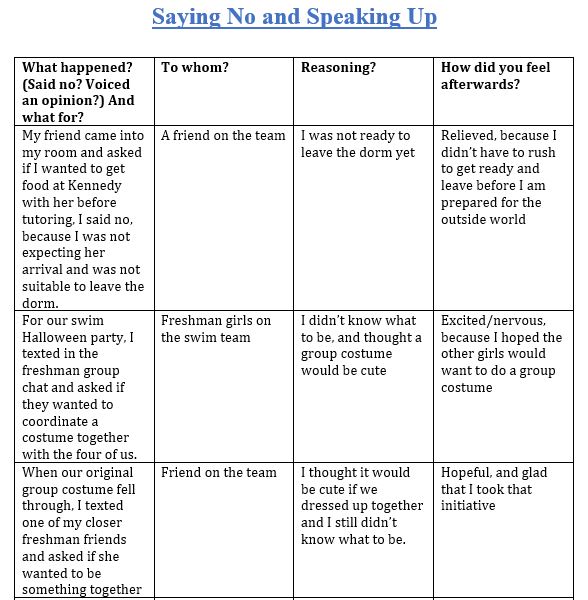
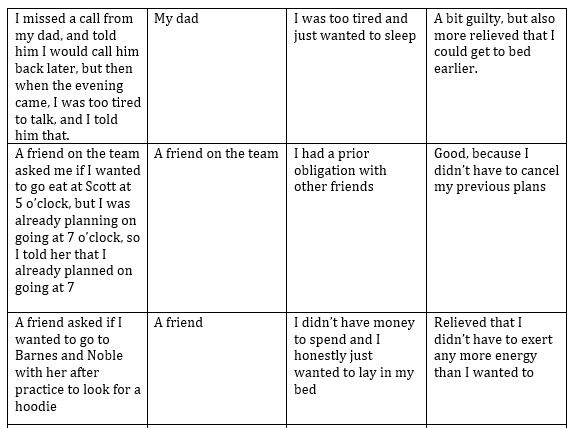
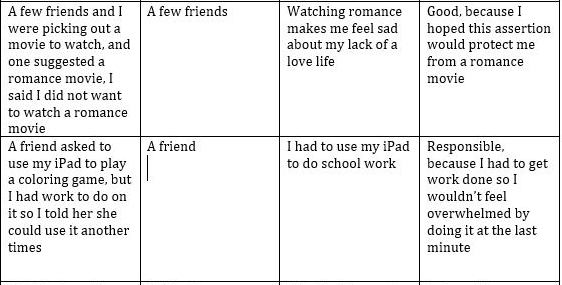
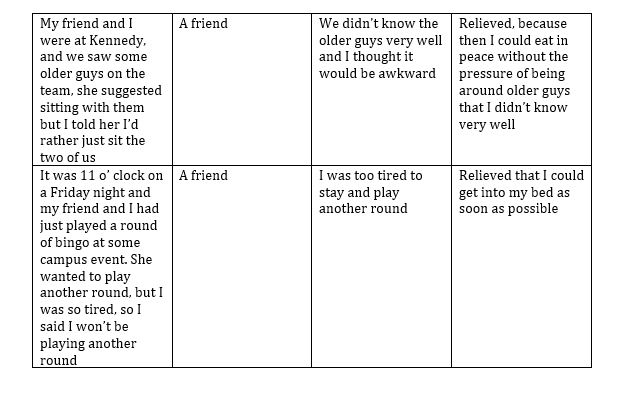
Attached is the chart I used to document the instances in which I said no, or spoke up about my opinion. First of all, to clear up a possible misconception: I don’t say no to every single social event, there are just some things I’d rather not do at the moment. Otherwise, it always feels like a relief to say no to something that I’d rather not do. I highly recommend it. From past experience, it is far better to be laying down in your bed watching Netflix after a slightly uncomfortable refusal, than to be out doing something you don’t want to do, thinking longingly about your bed.
Takeaways
I did not necessarily read anything my therapist hasn’t already drilled in my head, but since drilling into the head is a method of persuasion, I guess I benefitted from the repetition of those positive messages like “you have value” and “your opinion matters”. I think these are messages that everyone needs to hear, because as cliché as it sounds, everyone is valuable as a person and deserves to recognize and utilize that value.
For those of you reading this: even if you don’t realize it yet, YOU ARE VALUABLE AND IMPORTANT AND YOU DESERVE TO BE HEARD. It’s far easier said than done, as I know for a personal fact, but please love yourself, because you are the only self you have, and life is a lot easier when you are content in the vessel in which you experience it.
